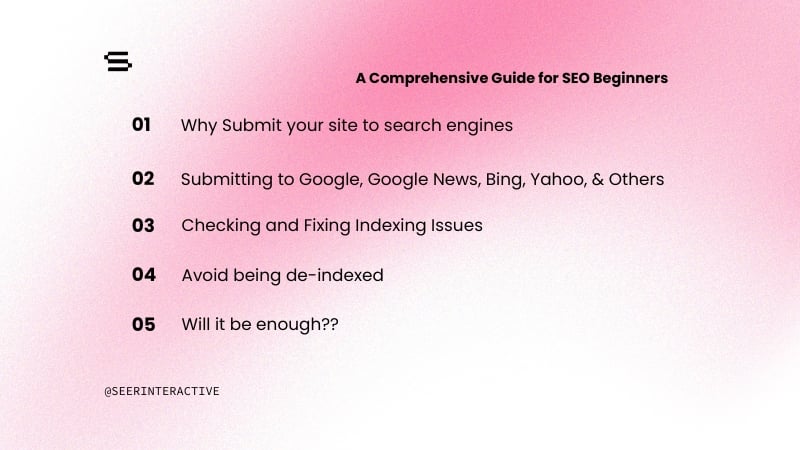SEER works hard to improve three main items from the beginning of any SEO campaign: Site Architecture, Quality Keyword Rich Content, Drive Value with Links.
If a keyword is ranked #58 for a keyword, we know we have some work to do. When a site jumps ahead of one of our clients and pushes them out of the top 10, it gets personal.
Below is a guide about spam results, how to detect them, and finally where to report them. If you want all the links to submit a spammy site, they're at the bottom (but if you skip all the interesting info you might not know what to look for!).
Discovering Companies Using Multiple Sites in Organic Search:
Companies we know are using multiple sites with the same content can be reported to the engines. Some of the tactics below allow you to identify the page in violation of Google Guidelines. The main one we'll review today is "Don't create multiple pages, subdomains, or domains with substantially duplicate content."
1. Discovering within search results: Duplicate title tags & meta descriptions are often picked up by engines, so this isn't a great way to find multiple listings. We first look at the URL format. A recent search for a keyword a client is targeting brought up four sites within the top 15 results with the URL formats listed below:
companya.com/product406.asp companyb.com/product-id406.asp companyc.com/product-406.asp companyd.com/product406.asp
Is it possible two separate companies just by chance have the same product number? Sure, and I would still vet it to make sure it's not spam. So, when four sites have the same product numbers, this raises a big flag. Looking further into the pages, each had the same exact product pricing and nearly identical content. This doesn't create a good user experience for searchers. Who wants to see the same content & prices for a product and the only difference is the layout of the page?
2. Discovering through WhoIs: Once you find a duplicate listing like the example above, build a case so there is no uncertainty from Google, Yahoo, or Bing that the results is a duplicate page. Check any matching information through the WhoIs database. The business address, email & registrar name can easily be switched around and often times the nameservers give it away.
3. Discover through content duplication: As mentioned above, if you already see the page and know there is duplicate content, great. If you want to check for duplicate content, drop a couple of 7 word phrases from the site into a quote search in Google to see who else is coming up. Are the results bringing back any other sites that are ranked well?
4. Discover through backlinks: Many times duplicate sites will build links at the same rate. One tool that proves useful to find our linkbuilding rates is found through MajesticSEO. It's a free tool and can show you a very insightful chart like the one below.

Reporting Companies in GoogleBase:
Organic search has been around a long time, but GoogleBase is a little newer. This just means there are new ways individuals can spam these results. Below are a few ways we've seen companies spam it recently:
1. Listing rebate pricing/quantity discount pricing instead of the price for each item is a violation of GoogleBase guidelines. Buying 1 tub of muscle milk sounds pretty nice for $15. To find out $15 is the quantity discount price when you buy 20 of them creates a poor user experience.
2. Searching for Nike Golf Balls and seeing a GoogleBase product result listed at $1 sounds like a great deal until you click through to find that you have to buy a package of 20 for $20 and 1 golf ball is not available.
3. Searching for TPX bat might bring back three results: TPX Left Handed Bat, TPX Right Handed Bat, Fall Ball TPX Bat. This example is made up, but something extremely similar was listed this past week with three results from the same exact company for an alternative (and fake) version of the product that is the same exact product. FYI, all bats are equal and while there are different sizes & weights, there are no left hand or right hand specified bats.
Where to Report
Google Spam Report Page - http://www.google.com/contact/spamreport.html
This page allows you to report the search you did, the issue you're seeing, and then provides a spot for an explanation why you believe the results are skewed/spammy. You can also send an email to report spam at spamreport@google.com. While testing how effective these reporting tools are, it seems to drop the sites reported a little over 50% of the time.
Google's Quality Form - http://www.google.com/quality_form
You'll find this at the bottom of any search page. Reporting through the quality form is similar to the spam form, but is just another arena to place a complaint IN ADDITION to the spam report page above.
Google Webmaster Forum Reporting - http://www.google.com/support/forum/p/Webmasters/
Google's webmaster forum can be used as another alternative when there is no change in ranking or response through the reporting tools above. The forum is check by Google, but also has credible users that can help add or bring clarity to a spam situation. You'll probably be outting a competitor to the webmaster world, so be prepared if you do this to be reviewed under a microscope by the community & competitors, especially if you're using a name that can be associated with your product/company. You'll want to post in the most relevant section, which is the Crawling, Indexing, & Ranking section.
Google Paid Link Reporting Site - https://www.google.com/webmasters/tools/paidlinks
While many companies do this in some capacity, Google does not want purchased links impacting rankings. You can report a site that is blatantly using paid links. Most likely, the site will cease to pass value and the actual sites listed will not be penalized. Why? Because anyone can sign up a competitor to receive extremely bad paid text links on dumpy sites and then report them to Google. Not very far fetched when several paid text links can be purchased for under $5.
GoogleBase Reporting - http://base.google.com/support/bin/request.py?contact_type=policy
Report spam results mentioned above through this form. Be prepared to provide specific details into why it's a spam listing.
Yahoo Spam Reporting - http://help.yahoo.com/l/us/yahoo/search/spam_abuse.html
Bing Spam Reporting - https://support.discoverbing.com/eform.aspx?productKey=bingcontentremoval&ct=eformts
Reporting spam to Bing can also be done through the Feedback link on the bottom righthand side of the homepage.
If you have a "stop snitchin" mentality, your tune will change when a spam site bumps you and your revenues off the first page.
From our research, it's well worth the few minutes to report a site implementing spammy/blackhat tactics to get your client or company back into the top 10. A broken down & simple explanation for the engines could help them see why it is spam faster, so take the time to research the proper ways described above to identify sites that violate engine guidelines.


